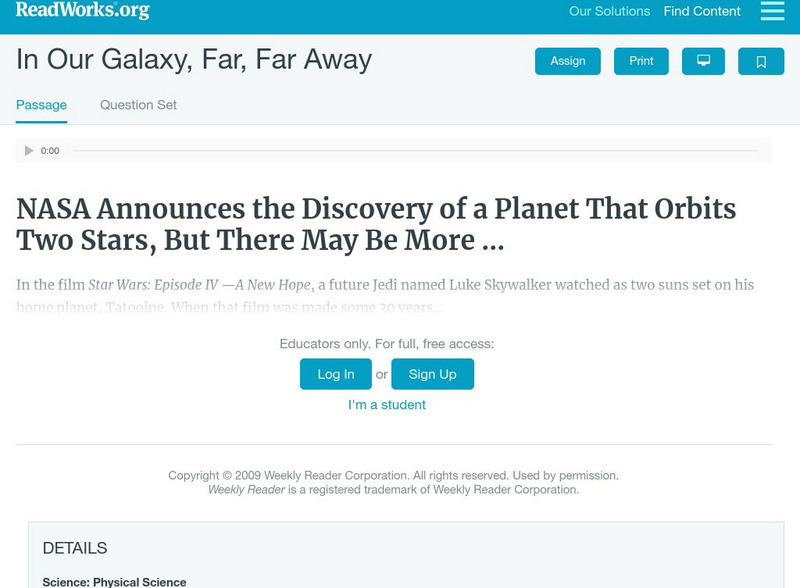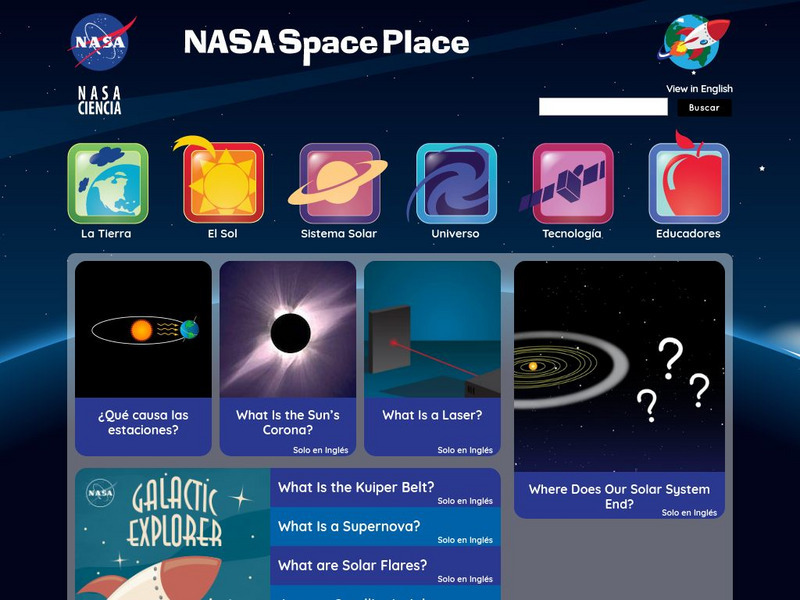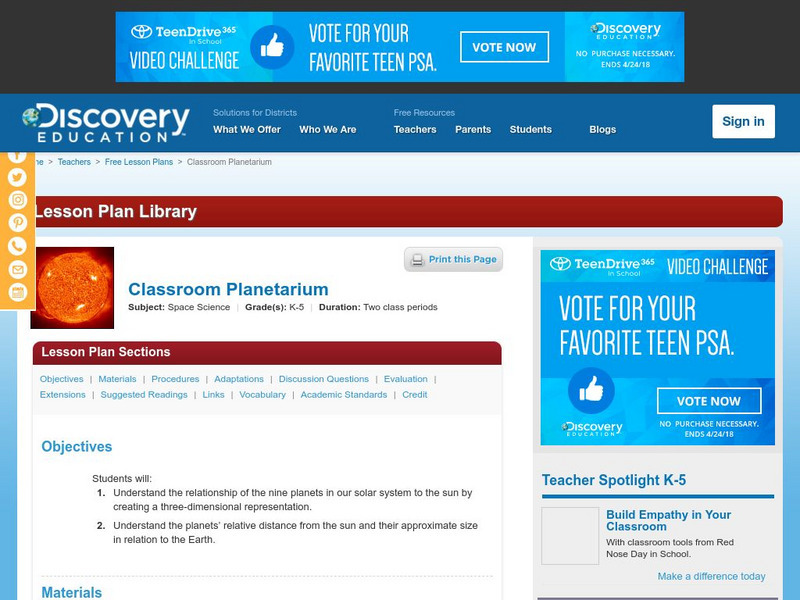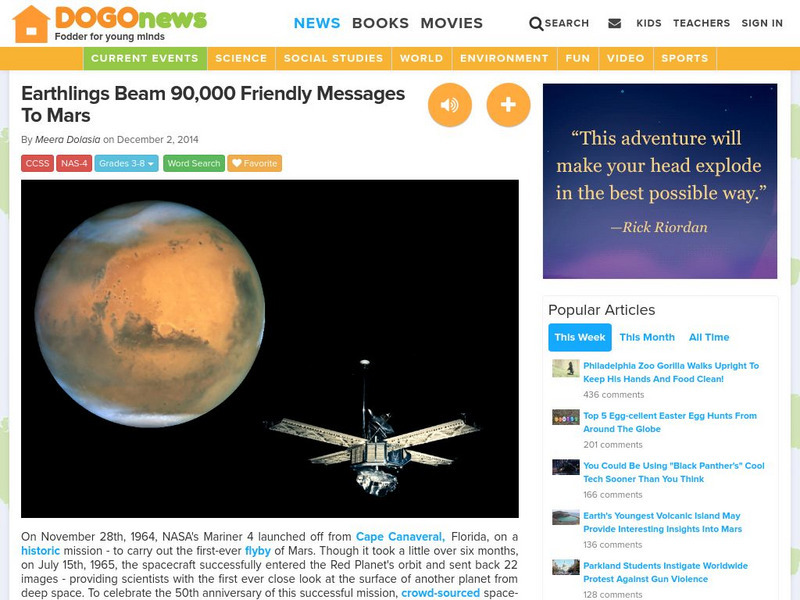Hi, what do you want to do?
Other
Canal Kids: Ciencias (Science for Portuguese Speakers)
Colorful, engagingly written information about astronomy and biology for Portuguese-speaking English language learners. Both subjects are broken down into a broad array of related subtopics. The biology section is particularly helpful...
Science Buddies
Science Buddies: Stargazing for Satellites
Did you know you can see many satellites with the naked eye? Try this activity and find out for yourself!
NASA
Nasa: The Space Place: Looking for Water Everywhere!
NASA has discovered water in space. This interactive resource allows you to examine the different planets and moons in our solar system to find out where their water is located.
Read Works
Read Works: In Our Galaxy, Far, Far, Away
[Free Registration/Login Required] An informational text about earth-like planets in other solar systems. A question sheet is available to help students build skills in reading comprehension.
Ducksters
Ducksters: Astronomy for Kids: The Planet Uranus
Kids learn about the ice giant planet Uranus of the Solar System including fun facts, mass, day, year, and distance from the Sun. Astronomy for kids and teachers.
Ducksters
Ducksters: Astronomy for Kids: The Planet Venus
Kids learn about the planet Venus of the Solar System including fun facts, mass, day, year, and distance from the Sun. Astronomy for kids and teachers.
Ducksters
Ducksters: Astronomy for Kids: The Planet Jupiter
Kids learn about the planet Jupiter of the Solar System including fun facts, mass, day, year, and distance from the Sun. Astronomy for kids and teachers.
Ducksters
Ducksters: Astronomy for Kids: The Planet Mars
Kids learn about the planet Mars of the Solar System including fun facts, mass, day, year, and distance from the Sun. Astronomy for kids and teachers.
Ducksters
Ducksters: Astronomy for Kids: The Planet Mercury
Kids learn about the planet Mercury of the Solar System including fun facts, mass, day, year, and distance from the Sun. Astronomy for kids and teachers.
Ducksters
Ducksters: Astronomy for Kids: The Planet Neptune
Kids learn about the ice giant planet Neptune of the Solar System including fun facts, mass, day, year, and distance from the Sun. Astronomy for kids and teachers.
Ducksters
Ducksters: Astronomy for Kids: The Planet Saturn
Kids learn about the planet Saturn of the Solar System including its rings, mass, day, year, and distance from the Sun. Astronomy for kids and teachers.
Enchanted Learning
Enchanted Learning: Zoom Astronomy
Where is our Solar System? How far away is the sun? What makes up the sun? Find out all you want to know about our solar system. This is a comprehensive on-line site about space and astronomy. Check out all of the excitement!
Other
Kid Power: Astronomy for Kids
Young children can find facts about the Solar System, the Sun, meteorites, stars, galaxies, planets, our moon, comets, asteroids, and space exploration. Pages offer clear photos and bullet-point information, which is easy to read and...
Other
Lunar and Planetary Institute: Explore! Ice Worlds
Features a collection of hands-on activities, investigations, and explorations designed to engage students in learning about ice, both in the solar system and on planet Earth.
NASA
Nasa: Huge Springtime Storms Hit the Planet Uranus
Describes in detail the devastating storms that occur on Uranus.Also includes an .mpeg movie showing the rings of Uranus up close. (Mar. 29, 1999)
NASA
Nasa Space Place: El Space Place
NASA's space science site for kids - en Espanol. Features a wide range of activities, including games, projects, animations, and more. Also contains useful information on basic physics, chemistry, and other natural sciences, offering...
Discovery Education
Discovery Education: Classroom Planetarium
Create a classroom model of the solar system while teaching about relative size of all the planets, and each planet's distance from the sun.
Cosmo Learning
Cosmo Learning: Introduction to Astrophysics
A collection of audio lectures from an introduction to astrophysics course taught at the University of California, Berkeley. The course discusses the solar system, stars, quantum mechanics, gravitation, and cosmology focusing on how...
California Institute of Technology
Cool Cosmos: Ask an Astronomer: Pluto
Visit this site and learn more about Pluto. Provides the answers to kids' most frequently asked questions.
BBC
Bbc Newsround: Pluto Pictures Show Hazy Horizon
View photos of Pluto from NASA's New Horizons probe.
NASA
Nasa: 21th Century Explorer: Why Do We Want to Study and Travel to Mars?
This article answers some of the most common questions about Mars: Why is it red? Is there water on Mars? What else have scientists discovered from spacecraft that have landed there? Also, visitors can follow links to learn more about...
DOGO Media
Dogo News: Earthlings Beam 90,000 Friendly Messages to Mars
Article reports on recent mission by a private space company to beam messages to Mars from Earth. Includes video.
Other
The Astronomy Cafe
NASA scientist Sten Odenwald calls this his "web site for the astronomically disadvantaged." Do you have lots of questions about space that you can't seem to get answers to? Would you like to learn about a career in astronomy, Big Bang...
DOGO Media
Dogo News: Week of 10 21 13: Does It Rain Diamonds on Saturn and Jupiter?
Article reports on research that suggests that rain on Saturn and Jupiter may be made of diamonds. Includes a brief video.
























